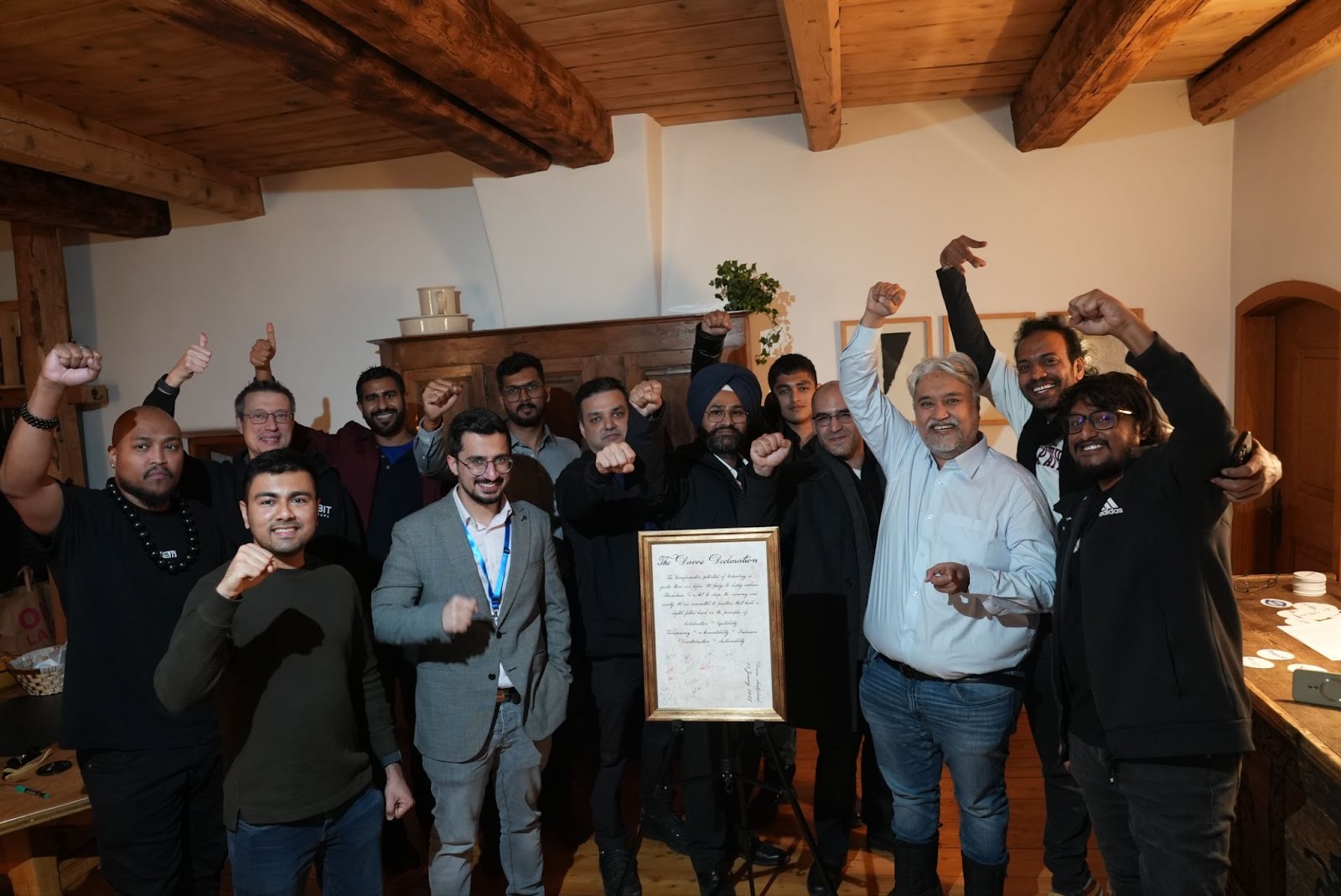DavosWeb3 Roundtable 2025 Concludes by Accelerating the Global Web3 Movement

Davos, Switzerland – January 23, 2025 – The highly anticipated DavosWeb3 Roundtable successfully concluded its inaugural gathering in the heart of Davos, where 100 of the brightest minds in Web3 converged to shape the future of decentralized technologies. This premier event transcended traditional conferences, acting as a launchpad for visionary collaborations, groundbreaking insights, and tangible commitments toward building a more inclusive and innovative global ecosystem.
A Historic Gathering
From seasoned blockchain pioneers to emerging Web3 entrepreneurs, delegates engaged in deep discussions on scalability, tokenomics, interoperability, decentralized finance (DeFi), and the evolving role of Web3 in driving economic transformation worldwide. By combining structured networking sessions and interactive roundtables, the roundtable created unprecedented opportunities for participants to forge meaningful connections and partnerships.
Roundtables That Shaped the Conversation

Four dynamic roundtables addressed core themes pivotal to the future of decentralization:
- Roundtable 1: “Forget Slogans, Can Crypto Coexist with Fiat?”
Thought Leaders: Vikram R Singh, Bibin Babu, Himanshu Gulathi, Olav Chen
This roundtable explored how crypto and fiat could feasibly integrate to bolster financial inclusion, stability, and consumer trust. - Roundtable 2: “Web3 Stops Discussing ‘Use Cases’ During Bull Markets?”
Thought Leaders: Jan Camenisch, John Shipman, Yat Siu, Sandy Carter
Thought Leaders examined the cyclical tendency of the Web3 community to overlook real-world use cases when the market surges, emphasizing the importance of consistent innovation and user adoption beyond speculative hype. - Roundtable 3: “Is Bitcoin Living Up to Satoshi Nakamoto’s Vision?”
Thought Leaders: Aly Madhavji, Kapil Dhiman, Patrick B, Punith B
Experts assessed Bitcoin’s evolution—its core principle of decentralization, security, and trustlessness—while debating how the original vision continues to influence new protocols and financial models. - Roundtable 4: “What Trumponomics Could Mean to Cryptonomics?”
Thought Leaders: Harshal Madnani, Dayakar Reddy, Itay Azaraty, William Bao Bean
A forward-looking discussion on how macroeconomic policies and political shifts might interact with the rapidly evolving crypto landscape, including possible regulatory considerations.
Signing of the Davos Declaration

A highlight of the roundtable was the signing of the Davos Declaration, a pledge and charter affirming the Web3 community’s commitment to innovation, inclusion, sustainability, and integrity. Global Web3 leaders united under this historic document, underscoring a shared vision to nurture responsible growth across decentralized ecosystems.
Launch of the “New Billion” Whitepaper
Founding members of DavosWeb3 unveiled a visionary whitepaper titled “Ushering a New Billion into the Global System: The Next Frontier.” It proposes actionable strategies to accelerate global adoption of decentralized technologies and drive economic inclusion. Copies of the whitepaper will be distributed to media outlets, universities, trade bodies, and industry associations worldwide. To request a copy, please email: [email protected]
Sincere Gratitude to Sponsors, Patrons, and Delegates

DavosWeb3 extends heartfelt thanks to all sponsors, patrons, and delegates who made this landmark event possible. Leading Web3 organizations powering this Roundtable included:
Antier, Aptos, DroomDroom, Ecotrader, Flex Ecosystem, Internet Computer (ICP), Kandola Network, OmniFlix, Paycio, Pertin-ant, Quranium, Reflexical, RhinoSpider, Social888, Surge, Syscoin, Unstoppable Domains, Xade Finance, Xai Games.

Their unwavering commitment and forward-thinking solutions exemplify the innovative spirit driving the decentralized space.
Acknowledgment to Media & Community Partners
We also extend our gratitude to the media and community partners who lent their platforms and voices to amplify the conversation around Web3. Your coverage and engagement galvanized a global audience, highlighting the transformative potential of decentralized technologies.
Continuing the Movement
“The Web3 revolution is here, and DavosWeb3 Roundtable is more than just an event—it’s a movement,” said Ajeet Khurana, founding member of DavosWeb3. “By gathering the most influential minds in Web3, we have collectively charted a course for a future shaped by inclusion, innovation, and integrity.”
What’s Next?
The community formed at the DavosWeb3 Roundtable will continue to collaborate on projects, partnerships, and educational efforts aimed at ushering in the next wave of decentralized solutions. Future events are already being planned to sustain the momentum generated in Davos.
For more information, or to be part of the continuing DavosWeb3 initiatives, please contact:
[email protected]
About DavosWeb3 Roundtable
The DavosWeb3 Roundtable is a premier global platform uniting leaders, innovators, investors, and industry insiders to drive the advancement of decentralized technologies. Through high-impact gatherings, collaborative whitepapers, and strategic initiatives, it serves as the incubator for breakthrough solutions shaping the future of Web3.
Bybit hack forensics show SafeWallet compromise led to stolen funds
The cryptocurrency world has been rocked by yet another cyber attack, this time targeting the popular exchange platform Bybit and its SafeWallet developer. The attack, which occurred in February 2020, was confirmed to be the work of North Korea’s notorious hacking group, Lazarus Group.
Bybit, a leading cryptocurrency exchange platform, and its SafeWallet developer were the latest victims of the Lazarus Group’s malicious activities. The attack, which took place in February 2020, was confirmed by both Bybit and the SafeWallet developer.
The attack was carried out by the infamous North Korean hacking group, Lazarus Group, known for its sophisticated cyber attacks on various industries, including the cryptocurrency market. The group has been linked to numerous high-profile attacks, including the 2014 Sony Pictures hack and the 2017 WannaCry ransomware attack.
According to reports, the attack on Bybit and SafeWallet was a targeted phishing campaign, where the hackers sent out fake emails to users, tricking them into revealing their login credentials. This allowed the hackers to gain access to users’ accounts and steal their funds.
Bybit and the SafeWallet developer have since taken necessary measures to secure their systems and protect their users’ funds. They have also urged their users to enable two-factor authentication and be cautious of any suspicious emails or messages.
This attack serves as a reminder of the constant threat posed by cybercriminals in the cryptocurrency world. As the market continues to grow and attract more investors, it becomes a lucrative target for hackers. It is crucial for users to remain vigilant and take necessary precautions to protect their assets.
In conclusion, the recent attack on Bybit and SafeWallet by the Lazarus Group highlights the need for increased security measures in the cryptocurrency industry. It is a wake-up call for both exchanges and users to prioritize cybersecurity and stay one step ahead of potential threats. Let this be a lesson to all, that in the ever-evolving world of cryptocurrency, staying safe and secure is of utmost importance.
Oklahoma BTC reserve bill passes House Committee; other states reject
The state of Oklahoma is making headlines in the world of cryptocurrency with the recent passing of House Bill 1203, also known as the Strategic Bitcoin Reserve Act. This groundbreaking legislation, which was approved by the House Committee on February 25th, is a major step towards embracing and utilizing the power of Bitcoin and other digital currencies.
The bill proposes the creation of a state-run financial institution, the Oklahoma Strategic Bitcoin Reserve, which will be responsible for managing and investing in Bitcoin and other cryptocurrencies. This move is a bold and forward-thinking approach to diversifying the state’s financial portfolio and staying ahead of the curve in the ever-evolving world of finance.
The Strategic Bitcoin Reserve Act has received widespread support from both lawmakers and the public, with many recognizing the potential benefits it could bring to the state. By investing in Bitcoin, Oklahoma could potentially see significant returns and boost its economy. Additionally, the state would be positioning itself as a leader in the adoption and integration of digital currencies, attracting businesses and investors who are looking to be a part of this growing industry.
But the benefits of this legislation go beyond financial gains. By creating a state-run institution for managing Bitcoin, Oklahoma is also taking steps towards increasing financial literacy and education about digital currencies. This could lead to a more informed and empowered population, as well as a more inclusive and accessible financial system.
The passing of the Strategic Bitcoin Reserve Act is a significant milestone for Oklahoma and a testament to the state’s progressive and innovative mindset. As the world continues to embrace the potential of digital currencies, Oklahoma is positioning itself as a pioneer in this space. With this legislation, the state is not only securing its financial future but also paving the way for a more inclusive and technologically advanced economy.
Stablecoin competition heats up as MEXC invests $20M in Ethena’s USDe
USDe is a synthetic dollar stablecoin that has nearly $5.9 billion in circulation.
Pump.fun’s X account hacked – Users urged to avoid interaction
Pump.fun, a popular cryptocurrency platform, recently fell victim to a security breach on February 26th. The platform’s team has confirmed that the account of X, one of their top users, was compromised and used to promote fake tokens. This unfortunate incident has raised concerns among the cryptocurrency community and has shed light on the importance of security measures in the digital asset space.
The breach was discovered when Pump.fun’s team noticed unusual activity on X’s account. Upon further investigation, they found that the account had been accessed by an unauthorized party who used it to promote fraudulent tokens. The team immediately took action and suspended the account, as well as launching an investigation into the matter.
This incident serves as a reminder that even the most secure platforms are not immune to cyber attacks. With the rise of cryptocurrency popularity, hackers are constantly finding new ways to exploit vulnerabilities and steal valuable assets. It is crucial for users to take necessary precautions to protect their accounts and assets.
Pump.fun’s team has assured its users that all necessary measures are being taken to prevent such incidents in the future. They have also advised users to enable two-factor authentication and regularly change their passwords to enhance their account security. Additionally, the platform is working closely with law enforcement to track down the perpetrators and bring them to justice.
The cryptocurrency community has also come together to support Pump.fun and its affected users. Many have offered tips and advice on how to stay safe in the digital asset space, emphasizing the importance of being vigilant and cautious.
In conclusion, the recent security breach on Pump.fun’s platform serves as a wake-up call for all cryptocurrency users to prioritize their account security. It is crucial to stay informed and take necessary precautions to protect our assets in this ever-evolving digital landscape. Let’s work together to make the cryptocurrency space a safer and more secure place for all.
Bitcoin sets new 3-month low as analyst eyes $93.5K reclaim 'this week'
BTC price lows near $85,000 come amid hopes that they may just end up a Bitcoin bull market “deviation.”
Former CFTC lawyer says agency should take lead on memecoin regulations
The ongoing debate between the SEC and CFTC on who should regulate memecoins highlights the need for a comprehensive regulatory framework for digital assets. This lack of clarity has caused confusion and uncertainty in the cryptocurrency market, leaving investors and creators of memecoins in a state of limbo.
The Securities and Exchange Commission (SEC) and the Commodity Futures Trading Commission (CFTC) are two of the main regulatory bodies in the United States responsible for overseeing financial markets. However, when it comes to memecoins, there is a disagreement on which agency should have jurisdiction.
On one hand, the SEC argues that memecoins should be classified as securities, as they are often created and marketed as investment opportunities. This would mean that they fall under the SEC’s jurisdiction and must comply with securities laws, such as registration and disclosure requirements.
On the other hand, the CFTC argues that memecoins should be classified as commodities, as they are often used as a means of exchange and have a tangible value. This would mean that they fall under the CFTC’s jurisdiction and must comply with commodity trading regulations.
The lack of a clear regulatory framework for digital assets has led to this disagreement, leaving memecoin creators and investors unsure of how to proceed. This uncertainty has also hindered the growth and adoption of memecoins, as potential investors may be hesitant to enter a market with unclear regulations.
In order to promote innovation and protect investors, it is crucial for regulators to establish a clear and comprehensive framework for digital assets. This would provide much-needed guidance for memecoin creators and investors, and ultimately contribute to the growth and stability of the cryptocurrency market.
Until a clear regulatory framework is established, the debate between the SEC and CFTC will continue, and the future of memecoins remains uncertain. It is time for regulators to come together and provide a solid foundation for the evolving world of digital assets.
Crypto neo-privateers could be the solution to hacks
In today’s rapidly evolving world, the United States is facing new challenges and threats to its national security and economic prosperity. As a nation built on innovation and entrepreneurship, it is crucial for America to stay ahead of the curve and maintain its position as a global leader in technology and innovation. However, with the rise of cyber attacks, intellectual property theft, and other forms of economic espionage, it has become increasingly difficult for American businesses to protect their ideas and stay competitive in the global market.
That’s where the concept of privateering comes in. Privateering, a practice dating back to the 16th century, involves privately owned and operated ships authorized by a government to engage in acts of war against enemy ships. While this practice has been dormant for over 200 years, it is time for the United States to revive it in a modern form.
A modern privateer program would not only protect American entrepreneurs and their intellectual property, but it would also serve as a crucial tool in safeguarding national security interests. With the ability to operate in international waters, privateers would have the advantage of being able to track and intercept threats before they reach American shores. This would not only prevent potential attacks but also provide valuable intelligence to the government.
Moreover, a privateer program would also play a significant role in reasserting American leadership in technology and innovation. By partnering with private companies, the government can tap into the expertise and resources of the private sector, accelerating the development and deployment of cutting-edge technologies. This would not only benefit American businesses but also strengthen the country’s position as a global leader in innovation.
In conclusion, a modern privateer program would be a win-win for both American entrepreneurs and the nation as a whole. It would provide much-needed protection for businesses, enhance national security, and reaffirm America’s position as a leader in technology and innovation. It’s time for the United States to embrace this concept and pave the way for a more secure and prosperous future.







